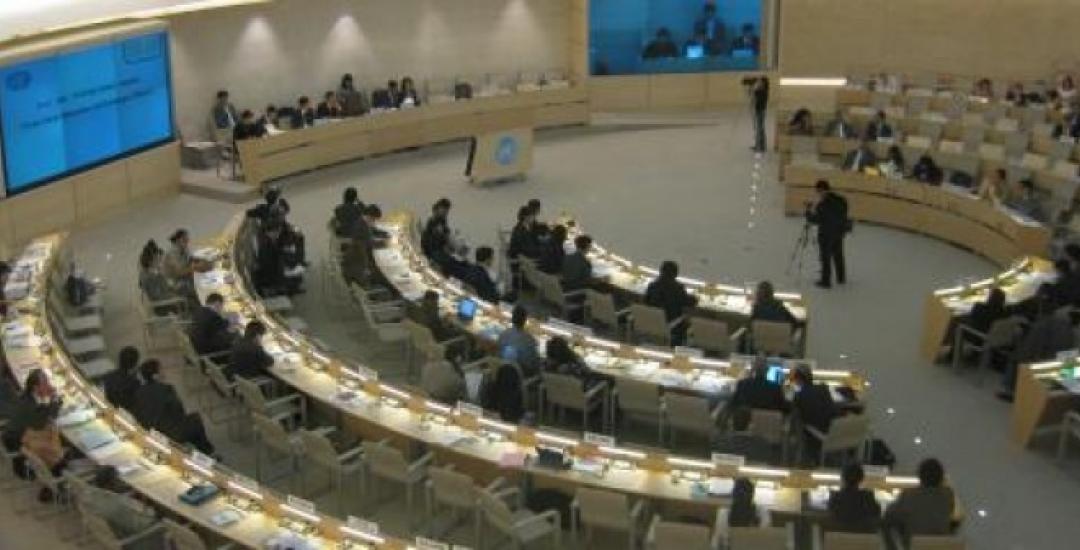
On 23 March 2015, Alkarama submitted its report in view of Oman's upcoming Universal Periodic Review (UPR), which will take place in November 2015 during the 23rd session of the UPR Working Group. The report provides information on Oman's implementation of recommendations made during its first review in 2011, as well as on the current human rights situation. In particular, the report outlines the main human rights violations committed by the authorities, notably arbitrary detention, violations of the right to freedom of expression and peaceful assembly, and the systematic retaliation against human rights defenders and peaceful political activists.
Crackdown on peaceful dissent, criticism and human rights activism
Since the peaceful demonstrations of 2011, the political situation has severely deteriorated in the country, where the separation of powers is non-existent and the judiciary, lacking independence from the executive, is increasingly used to crackdown on dissent and justify the brutal repression of peaceful gatherings, thus creating a climate of fear within Omani civil society.
Moreover, in the past years, Omani authorities have been less and less willing to cooperate with the United Nations' human rights protection mechanisms. One example is the case of Talib Al Ma'amari, a Member of the Omani Parliament, who is still held in solitary confinement for "harming the State's prestige" despite an Opinion from the UN Working Group on Arbitrary Detention (WGAD) considering his detention as arbitrary and requesting the authorities to release him. Another example is that of human rights defender, Said Jadad, who has been victim of numerous reprisals since his meeting with the UN Special Rapporteur on the rights to freedom of peaceful assembly and association (SR FPAA), Maina Kiai – including a has three-year prison sentence, also for "harming the State's prestige" – and is still detained despite a public call for his release from several Special Rapporteurs.
The testimonies gathered by Alkarama describe detention conditions in Oman as inhuman and degrading. Furthermore, the right to have access to a lawyer or to see one's relatives is never respected; as for interrogations of human rights defenders (HRDs), they're only ever related to their activities as HRDs, their links with international organisations including the UN, and the nature of the information they communicate.
Extremely restrictive laws on rights and freedoms
Despite the fact that during its first UPR, Oman accepted a recommendation calling on the authorities to strengthen the freedoms of expression, opinion and assembly, in reality the restrictions made to these freedoms have increased since 2011. In fact, the right to freedom of association has been made virtually inexistent due to an extremely restrictive legal regime for associations. The right to participation in political life is also made impossible in practice since political parties are forbidden.
The rights recognised under the Omani Basic Law are, in fact, emptied of their substance by laws which contain numerous exceptions on the basis of "public order" and "national security" to prevent any forms of collective action. For instance, Oman's Constitution recognises its citizens' right to assembly "within the limits of the law", leading to the punishment of peaceful gathering for "disturbing public order."
Similarly, although Oman also accepted, during its first UPR, to take measures to guarantee freedom of expression in conformity with international standards, but merely "noted" those concretely asking for, among other things, an amendment to the provisions in its Penal Code that criminalise the exercise of these freedoms by journalists.
Alkarama's report also expresses serious concerns regarding Oman's terrorism legislation which can be used to repress persons who peacefully try to participate in political life.
Finally, the 2014 amendments to the Nationality Law, which introduced provisions authorising the forfeiture of Omani nationality to any citizen who damages the State's image abroad, including through collaboration with "international organisations", is a development that does not bode well for Oman's human rights situation in the future.
Recommendations
Consequently Alkarama made the following recommendations to be relayed by the States during the next UPR.
1. Ratify the International Covenant on Civil and Political Rights (ICCPR) and the Convention against Torture (CAT), and its Optional Protocol (OPCAT);
2. Put an end to arbitrary arrest and detention, in particular when secret and incommunicado, and establish a legal framework in accordance with the principles guaranteeing respect for fundamental rights and freedoms;
3. Establish a definition of torture in accordance with international law;
4. Ensure full independence of the judiciary, including the establishment of a Supreme Judicial Council, independent and impartial from the executive branch;
5. Ensure freedom of opinion and expression in accordance with international standards and decriminalise free expression and peaceful protest against the government;
6. End reprisals against human rights defenders and peaceful activists; lift all travel bans, cease confiscation of identity documents, and release all those detained for participating in peaceful activities;
7. Amend the terrorism law to bring it in conformity with the guarantees and fundamental freedoms of a fair trial.
